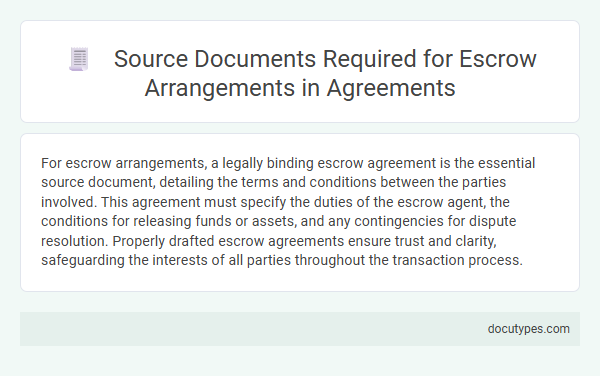For escrow arrangements, a legally binding escrow agreement is the essential source document, detailing the terms and conditions between the parties involved. This agreement must specify the duties of the escrow agent, the conditions for releasing funds or assets, and any contingencies for dispute resolution. Properly drafted escrow agreements ensure trust and clarity, safeguarding the interests of all parties throughout the transaction process.
Introduction to Escrow Arrangements in Agreements
Escrow arrangements serve as a secure mechanism in agreements where third-party funds or assets are held until contractual obligations are fulfilled. The source documents supporting these arrangements play a crucial role in ensuring transparency and legal compliance.
- Source Document Identification - Specifies the exact documents required to initiate and govern the escrow process.
- Deposit Instructions - Details the instructions for the transfer of funds or assets into escrow.
- Escrow Agreement - A formal contract outlining the roles, responsibilities, and conditions under which the escrow operates.
Clear documentation is essential to validate escrow arrangements and protect all parties involved in the agreement.
Definition and Purpose of Source Documents
Source documents in escrow arrangements serve as the definitive proof of transaction terms or conditions held by an impartial third party. These documents typically include contracts, purchase agreements, or financial statements that validate the obligations and rights of all involved parties. Their primary purpose is to ensure that funds or assets are released only when specified conditions are fully met, safeguarding Your interests throughout the process.
Common Types of Source Documents for Escrow
Escrow arrangements require specific source documents to ensure all parties comply with agreed terms. Identifying the correct type of source document is critical for the legal and financial validity of the escrow process.
- Escrow Agreement - This document outlines the terms, conditions, and obligations of each party involved in the escrow arrangement.
- Purchase Agreement - Commonly used in real estate and mergers, this contract details the sale conditions and triggers for release of escrow funds.
- Proof of Payment - Receipts or bank statements serve as source documents to verify the deposits made into the escrow account.
Legal Requirements for Escrow Documentation
Escrow arrangements require a formal escrow agreement as the primary source document, detailing the rights and responsibilities of all involved parties. Legal requirements mandate that the document clearly specify the conditions under which funds or assets are released from escrow. Compliance with jurisdiction-specific regulations ensures enforceability and protects parties against disputes during the transaction.
KYC (Know Your Customer) Documents in Escrow
| Source Document Type | Description | Purpose in Escrow |
|---|---|---|
| Government-Issued Identification | Valid passports, national ID cards, or driver's licenses | Verify the identity of parties involved to comply with KYC regulations |
| Proof of Address | Recent utility bills, bank statements, or official government correspondence | Confirm the residential address of clients to prevent fraud and money laundering |
| Corporate Documents | Certificate of incorporation, partnership agreements, or business licenses | Validate the legal existence and authority of business entities in escrow transactions |
| Tax Identification Number (TIN) | Official tax registration documents issued by relevant authorities | Ensure compliance with tax reporting requirements linked to escrow arrangements |
| Source of Funds Declaration | Bank statements, transaction receipts, or financial disclosures | Establish legitimacy of funds involved to comply with anti-money laundering policies |
Financial Records Needed for Escrow Agreements
Financial records play a crucial role in establishing and managing escrow arrangements, ensuring accuracy and legal compliance. Proper documentation is essential to verify the details and obligations associated with escrow agreements.
- Bank Statements - These documents verify the availability and movement of funds designated for escrow purposes.
- Purchase Agreements - Detailed contracts specifying the terms and conditions that govern the escrow arrangement are required.
- Proof of Payment - Receipts or transaction records confirm that the agreed funds have been deposited into escrow accounts.
Property and Asset Title Documents
Source documents required for escrow arrangements primarily include property and asset title documents that establish clear ownership. These documents serve as legal proof to safeguard all parties involved during the transaction process.
Property title deeds, certificates of ownership, and registration papers are essential to verify the asset's legitimacy. Accurate and verified title documents reduce risks and ensure smooth escrow disbursement upon agreement fulfillment.
Due Diligence Documentation for Escrow
Escrow arrangements require specific source documents to ensure proper due diligence and secure the transaction. These documents verify the identity, authority, and obligations of all parties involved in the escrow agreement.
Due diligence documentation for escrow typically includes identification documents, proof of ownership, and the escrow instructions outlining the terms. Financial statements or transaction evidence may be requested to confirm the source and legitimacy of funds. You must submit accurate and complete documentation to avoid delays and ensure compliance with regulatory requirements.
Authentication and Verification of Source Documents
Source documents required for escrow arrangements must undergo thorough authentication to ensure their legitimacy. Verification processes confirm the origin and validity of these documents, which is crucial for preventing fraud.
Commonly required source documents include contracts, title deeds, and financial statements, each subject to strict scrutiny. Authentication methods involve notarization, certified copies, and sometimes third-party validation to secure the escrow agreement.
What Type of Source Document Is Required for Escrow Arrangements? Infographic

